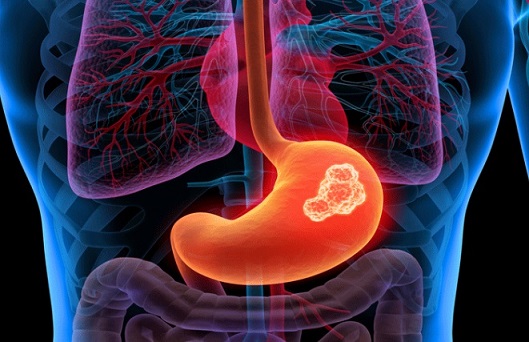Thailand Doctors Discover Low Rates of EBV and PD-L1 in Stomach Cancer Patients, Offering New Clues for Personalized Treatment
Nikhil Prasad Fact checked by:Thailand Medical News Team May 01, 2025 9 months, 1 week, 5 days, 12 hours, 39 minutes ago
Thailand Doctors: A team of Thai researchers has uncovered new insights into the prevalence of Epstein–Barr virus (EBV)-associated gastric cancer and PD-L1 protein expression—two important biomarkers with potential roles in guiding immunotherapy. The study, conducted at Prince of Songkla University, reveals that both EBV and PD-L1 positivity are relatively rare among gastric cancer patients in Thailand, suggesting regional and ethnic differences in how this cancer behaves at the molecular level.
 Thailand Doctors Discover Low Rates of EBV and PD-L1 in Stomach Cancer Patients, Offering New
Thailand Doctors Discover Low Rates of EBV and PD-L1 in Stomach Cancer Patients, Offering New
Clues for Personalized Treatment
Gastric cancer remains a serious global health issue and is one of the leading causes of cancer deaths. A growing body of international research has pointed to EBV and PD-L1 as important markers for treatment selection, particularly for immunotherapy. However, how common these markers are and their impact on prognosis vary depending on where patients live and their genetic backgrounds. This Medical News report focuses on the Thai population and sheds light on how treatment approaches might need to be adapted accordingly.
Key Findings from the Thai Study
The study involved 132 patients diagnosed with gastric cancer between 2017 and 2023 at Songklanagarind Hospital, Songkhla. Out of these patients, only 6 (or 4.5%) tested positive for EBV-associated gastric cancer (EBVaGC), and 12 (or 9.1%) showed PD-L1 positivity using the combined positive score (CPS) method—a score of 1 or more was considered positive.
Interestingly, none of the EBV-positive patients showed a statistically significant correlation with PD-L1 positivity, a finding that challenges the idea that EBV status might predict immunotherapy response through PD-L1 pathways. Most of the EBV-positive cases were older males who had smoked and had tumors located in the middle or upper part of the stomach. These tumors were mostly poorly differentiated but did not show the common "signet ring" cell features seen in other forms of gastric cancer.
Despite these patterns, the small number of EBVaGC cases meant that none of these associations reached statistical significance.
PD L1 Expression Also Rare in Thai Patients
PD-L1 expression, a key predictor for checkpoint inhibitor therapy, was also low in this group. Only 9.1% of the entire cohort had PD-L1 positivity at the CPS ≥1 level. When looking at more stringent CPS cutoffs (such as ≥5 or ≥10), the prevalence dropped even further. These figures are significantly lower than those reported in Western populations and even other Asian countries, hinting at a unique molecular profile in Thai patients.
PD-L1-positive patients did not show major differences in clinical outcomes compared to PD-L1-negative ones. The median overall survival for PD-L1-positive patients was 14.19 months compared to 9.79 months for PD-L1-negative patients—an improvement, but not a statistically significant one.
No Clear Survival Advantage Linked to EBV or PD L1
Overall survival data painted a sobe
ring picture. Median survival for EBVaGC patients was 9.48 months, compared to 10.32 months for those without EBV involvement. In PD-L1-positive cases, survival was slightly better but again not significant enough to suggest these markers have strong prognostic value in isolation.
Other factors proved more predictive. Patients with localized disease and good performance status (as measured by the ECOG scale) had better survival rates. Low albumin levels—a marker of poor nutritional and general health—were linked to worse outcomes.
Interestingly, in the subgroup of patients with metastatic gastric cancer, those who received palliative chemotherapy had a dramatically better median survival of 10.64 months compared to just 1.31 months for those who only received supportive care. Similarly, those who had palliative surgery lived longer than those who did not.
Implications for Cancer Treatment in Thailand
The low frequency of EBV and PD-L1 positivity in Thai gastric cancer patients suggests that current global strategies emphasizing immunotherapy might need to be fine-tuned for local populations. Since immunotherapy is most effective in PD-L1-positive patients and potentially in EBVaGC, Thai patients may not benefit as much unless additional markers or methods of predicting response are identified.
Moreover, the study revealed critical barriers in Thailand’s healthcare system. Many patients were not tested for HER2 or PD-L1 due to lack of funding or reimbursement. None of the PD-L1-positive patients received immunotherapy—largely because the treatment is not covered under most Thai healthcare schemes. These limitations highlight the urgent need for policy changes to ensure equitable access to modern cancer treatments.
Conclusion
This study by
Thailand Doctors from the Faculty of Medicine at Prince of Songkla University underscores the importance of regional and ethnic differences in cancer biology. EBV-associated gastric cancer and PD-L1 positivity are notably rare in Thai patients and are not reliable indicators of survival outcomes in this context. However, their presence may still offer clues about responsiveness to immunotherapy. These findings call for larger, multi-center studies to explore the true value of these biomarkers and pave the way for more personalized cancer treatment in Thailand. It is also critical that health policy makers improve access to essential testing and immunotherapy drugs so all patients can benefit from advances in cancer care.
The study findings were published in the peer reviewed journal: Cancers.
https://www.mdpi.com/2072-6694/17/9/1492
For the latest on
Thailand Doctors, keep on logging to Thailand Medical News.
Read Also:
https://www.thailandmedical.news/news/new-hope-for-hard-to-treat-digestive-cancers-as-treatment-strategies-rapidly-evolve
https://www.thailandmedical.news/news/john-hopkins-researchers-develop-new-diagnostic-blood-test-to-identify-gastric-cancer-recurrence-
https://www.thailandmedical.news/news/scientist-from-romania-discover-that-dopamine-influences-gastric-cancer-progression
https://www.thailandmedical.news/articles/cancer
